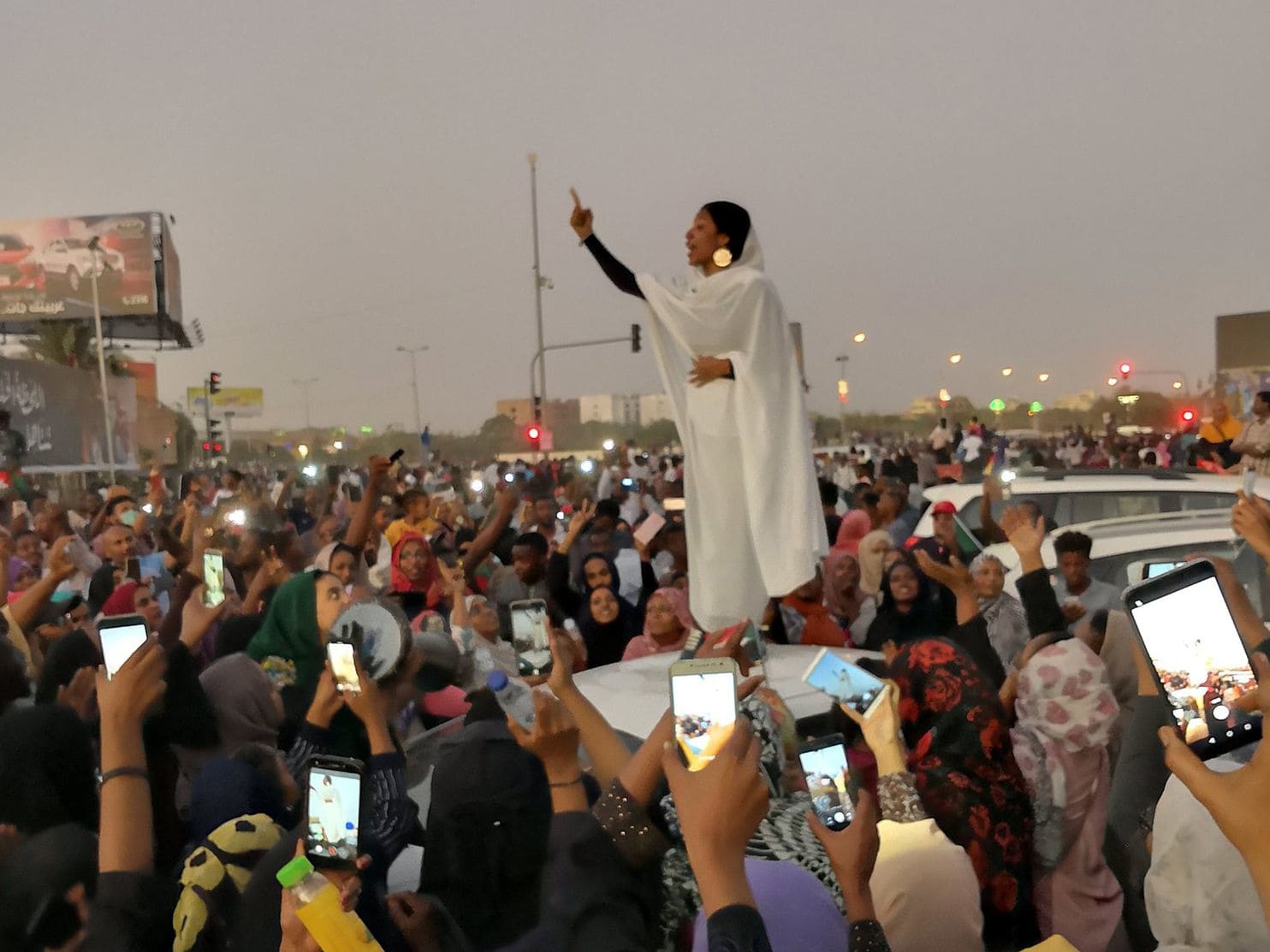Sudan protests: Powerful photo of demonstrator at anti-government rally becomes symbol of women’s defiance
‘She was telling the story of Sudanese women. She was perfect,’ says photographer

Your support helps us to tell the story
From reproductive rights to climate change to Big Tech, The Independent is on the ground when the story is developing. Whether it's investigating the financials of Elon Musk's pro-Trump PAC or producing our latest documentary, 'The A Word', which shines a light on the American women fighting for reproductive rights, we know how important it is to parse out the facts from the messaging.
At such a critical moment in US history, we need reporters on the ground. Your donation allows us to keep sending journalists to speak to both sides of the story.
The Independent is trusted by Americans across the entire political spectrum. And unlike many other quality news outlets, we choose not to lock Americans out of our reporting and analysis with paywalls. We believe quality journalism should be available to everyone, paid for by those who can afford it.
Your support makes all the difference.A defiant image of a young Sudanese woman standing on the roof of a car fervently leading chants at an anti-government protest has been widely shared on social media.
The photo, which was taken in the Sudanese capital of Khartoum, has become an emblem of resistance for Sudanese women in a country that has been swept by nationwide protests which have seen women at the forefront.
The viral image shows a crowd of Sudanese protesters – who are predominantly women – surrounding the towering female demonstrator, recording her with their phones.
The woman in the photo, who is clad in a white robe and gold circular earrings, cuts a striking figure against the twilight sky. Her white thobe, a cotton robe, is traditionally worn by professional women in the northeast African country’s workforce.
The woman, who some news outlets have identified as 22-year-old Alaa Salah, can be seen raising her arm as she leads the crowd in a chant and they repeat her words back to her.
The crowd can be heard shouting “thawra!” which is Arabic for “revolution.”
The image was rapidly widely disseminated on social media – with people comparing the young protester to the Statue of Liberty and others saying the image will be in the “history books”.
Lana Haroun, a local photographer who is responsible for the image, told CNN the protester “was representing all Sudanese women and girls, and she inspired every woman and girl at the sit-in.”
She said: “She was telling the story of Sudanese women ... She was perfect.”
Ms Haroun added: “We have a voice. We can say what we want. We need a better life and to stay in a better place.”
Ahmed Kaballo, a Sudanese commentator living in the UK, said the picture gave him hope.
“When I saw this picture it made me smile and I am sure it would have made my father smile,” he said. “Although my father is detained for the second time in two years without charge, trial or due process, he always spoke about Sudanese women, who have suffered the most under this brutal dictatorship with the lack of representation and the repressive penal code that disproportionately targets women.”
Mr Kaballo noted that in some ways Sudan was a pioneer in women’s rights in the region – adding that it was the first country in Africa to elect a female parliamentarian, Fatima Ahmed Ibrahim.
“Some of the biggest pyramids within Sudan are dedicated to Sudanese queens,” he added. “So to see this picture and to see the role Sudanese women have played in the popular uprising gives us hope that our Sudanese sisters may return back to their thrones.”
Thousands descended on the streets of Khartoum on Monday evening calling for the president Omar al-Bashir – who has been in power since 1989 – to step down.
Women have been centre stage in protests that have hit the nation which has long been known for the state’s systematic repression of women.
Some estimates calculate 70 per cent of individuals who have taken to the streets have been women. Many renowned women activists have been detained since the first wave of protests at the end of last year.
A 2015 report by Human Rights Watch (HRW) described how national security services targeted women activists during clampdowns.
The “public order police” arrest women and girls for their choice of dress – such as wearing trousers or exposing their hair – or for simply riding in a car with members of the opposite sex, HRW said.
The organisation said corporal punishments such as flogging and stoning for “morality crimes” – including adultery – have been used disproportionately on women and girls.
Demonstrations started in Sudan in December over the cost of bread tripling and cashless ATMs, among other things. The International Criminal Court has had a warrant out for Mr Bashir’s arrest for years – with charges against him including crimes against humanity and genocide.
Protesters are calling for the military to stop protecting the president whose career has been largely defined by war. At least eight people have been killed in recent days in violence linked to the protests.
Join our commenting forum
Join thought-provoking conversations, follow other Independent readers and see their replies
Comments